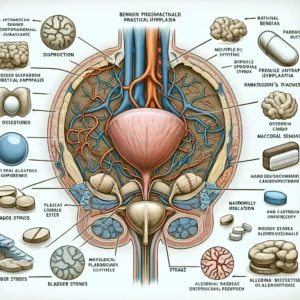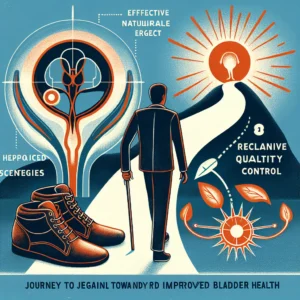Transforming Your Life: Effective Solutions for Overcoming Frequent Urination Challenges
Experiencing the difficulties associated with Overactive Bladder Syndrome (OAB) can escalate from a mere annoyance into a significant disruption in your everyday life. This condition can profoundly impact your sleep quality, erode your self-esteem, and even strain your personal relationships. If you find yourself frequently rushing to the bathroom throughout the day, awakening multiple times during the night, or grappling with sudden, intense urges to urinate, understand that you are not alone. Many men endure these distressing symptoms, often misattributing frequent urination to the natural aging process. However, you don’t have to resign yourself to this as a permanent state—numerous effective solutions exist to help you reclaim control over your life and improve your overall well-being.
Unpacking the Complexities of Overactive Bladder Syndrome
Overactive Bladder Syndrome (OAB) is a common condition that affects millions of individuals worldwide, yet it remains a health issue that is often underrepresented and inadequately discussed. OAB is characterized by a breakdown in communication between the bladder’s nerves and muscles, resulting in frequent and compelling urges to urinate. Unlike a urinary tract infection (UTI), which is generally a temporary ailment readily treated with antibiotics, OAB is a chronic condition that necessitates a strategic combination of management strategies and lifestyle modifications. Several factors can trigger this syndrome, including an enlarged prostate, certain neurological disorders, and dietary habits that may irritate the bladder, highlighting the importance of a thorough understanding of its causes and implications.
Recognizing the Distressing Symptoms of Overactive Bladder Syndrome
A healthy bladder can comfortably hold urine for several hours; however, OAB disrupts this natural function, leading to a range of distressing symptoms that can significantly intrude on daily life. You may find yourself making more than eight trips to the restroom each day, frequently waking at night due to the urgent need to urinate (nocturia), or feeling an overwhelming, sudden urge to relieve yourself. In certain cases, individuals may also encounter urge incontinence, which results in uncontrollable leakage before reaching a toilet. Although these symptoms might seem trivial initially, they can accumulate over time, severely impairing your productivity at work, negatively affecting your social interactions, and compromising your overall mental health.
 Exploring the Root Causes Behind Overactive Bladder Syndrome
Exploring the Root Causes Behind Overactive Bladder Syndrome
The bladder functions as a dynamic organ, relying on a sophisticated interplay of muscle contractions and nerve signals to operate effectively. Disruptions in this intricate system can lead to the emergence of OAB. For many men, a frequent culprit is benign prostatic hyperplasia (BPH), which can create pressure on the bladder and hinder complete emptying. Additionally, neurological conditions such as Parkinson’s disease, multiple sclerosis, and stroke can drastically affect normal bladder control. Other contributing factors include bladder stones, certain medications, and high intake of alcohol and caffeine, emphasizing the multifaceted nature of this condition.
Understanding the Disruption to Daily Life Caused by Overactive Bladder Syndrome
If your daily routine revolves around restroom availability, you are likely acutely aware of how disruptive OAB can be. Beyond the physical discomfort, the ramifications of this condition can be extensive and far-reaching. Sleep quality frequently suffers due to repeated nighttime bathroom trips, while work performance may decline as you find yourself stepping away from crucial meetings or tasks. Furthermore, intimacy and sexual health can be adversely affected due to feelings of embarrassment or anxiety surrounding potential leakage. Over time, these obstacles can lead to feelings of anxiety, depression, and social isolation. Fortunately, practical and effective solutions exist that do not necessarily rely on invasive procedures or medications that could result in undesirable side effects.
Proven Strategies for Regaining Control Over Your Bladder Health
Effectively managing OAB demands a holistic approach that transcends merely limiting fluid intake or avoiding caffeine. A comprehensive strategy focused on bladder health, nerve function, and muscle control is essential for achieving meaningful improvement. Thankfully, natural therapies, lifestyle modifications, and alternative treatments have shown promising results in alleviating symptoms without the potential risks associated with conventional prescription medications.
Adopting a Comprehensive Holistic Strategy for OAB Management
Recent research increasingly supports the effectiveness of herbal medicine, acupuncture, and tailored exercises in managing bladder dysfunction. By concentrating on the underlying causes rather than simply masking the symptoms, you can achieve long-lasting relief and empower yourself to take charge of your health journey.
 Utilizing Herbal Remedies to Support Enhanced Bladder Function
Utilizing Herbal Remedies to Support Enhanced Bladder Function
Nature offers a wealth of remedies for promoting urinary health. Herbal extracts such as horsetail, nettles, and dandelion have been used for generations to support healthy bladder function. Horsetail acts as a natural diuretic, helping to reduce fluid retention while strengthening bladder tissue. Nettles possess anti-inflammatory properties and promote prostate health, making them particularly beneficial for men dealing with OAB linked to BPH. Additionally, dandelion root aids urinary tract health by eliminating toxins and supporting kidney function. When consumed in micro-encapsulated daily doses, these herbal remedies can provide consistent support without the adverse effects commonly seen with synthetic medications.
Employing Acupuncture Techniques to Enhance Bladder Control
The principles of Traditional Chinese Medicine highlight the significance of energy flow in maintaining optimal organ function. Acupuncture, which involves the insertion of fine needles into targeted points on the body, has been shown to effectively regulate bladder activity. Research indicates that acupuncture can improve bladder control by calming overactive nerves and strengthening pelvic floor muscles. Over time, this practice can lead to reduced urges, increased bladder capacity, and improved sleep quality.
Strengthening Your Pelvic Floor for Optimal Bladder Control
Weakened pelvic muscles can significantly contribute to the symptoms associated with OAB. Targeted pelvic floor exercises, commonly referred to as Kegel exercises, can effectively strengthen these muscles, resulting in improved bladder control. Unlike high-impact workouts that may aggravate urinary issues, Kegel exercises are discreet, can be performed in various settings, and are highly effective. Regular practice not only helps prevent leakage but also diminishes the sudden urgencies that characterize OAB.
Implementing Transformative Lifestyle Changes for Significant Improvements
If OAB is negatively affecting your quality of life, it’s crucial to reassess your daily habits. Reducing your intake of caffeine, alcohol, and artificial sweeteners can lead to substantial improvements, as these substances are known irritants to the bladder lining. Staying properly hydrated is important, but the timing of fluid intake also matters—consider hydrating earlier in the day and limiting liquid consumption in the evening to decrease nighttime restroom visits. Additionally, managing stress is vital, as anxiety can trigger bladder spasms and exacerbate symptoms. Engaging in deep breathing exercises, meditation, and mindfulness practices can help soothe the nervous system and enhance bladder control.
 Take Charge of Your Bladder Health and Transform Your Life Today
Take Charge of Your Bladder Health and Transform Your Life Today
Living with OAB should not dictate the quality of your life. By implementing the right strategies, you can regain control over your bladder, enhance your confidence, and improve your overall quality of life. If you’re ready to explore natural therapies, acupuncture, and personalized guidance tailored to your unique needs, now is the perfect time to take action. There’s no reason to endure discomfort in silence when effective solutions are readily available.
Your Concerns Addressed: Frequently Asked Questions about OAB
What are the primary causes of overactive bladder in men?
The prevalence of overactive bladder in men is often associated with prostate enlargement, nerve dysfunction, bladder irritation, and various lifestyle choices. Certain medications and underlying health conditions can also play a role in the development of symptoms.
How can I differentiate between OAB and simple excessive fluid intake?
The key symptoms of OAB include frequent urination, sudden urgency, and nighttime awakenings, irrespective of your fluid consumption. If decreasing your water intake does not alleviate these symptoms, it likely points to an underlying bladder dysfunction rather than mere overhydration.
Are herbal treatments effective for improving bladder control?
Yes, herbal remedies such as horsetail, nettles, and dandelion have been historically used to enhance urinary health. When utilized in appropriate dosages and forms, these remedies can aid in reducing urgency, strengthening bladder tissue, and improving control over urinary functions.
Can acupuncture truly alleviate symptoms of OAB?
Clinical studies indicate that acupuncture can effectively regulate bladder activity, diminish urgency, and strengthen pelvic muscles. Many individuals report significant improvements in their symptoms following consistent acupuncture treatments.
Is experiencing OAB a normal part of aging?
While changes in bladder function may occur with age, OAB is not an unavoidable aspect of aging. Symptoms can be effectively managed through appropriate lifestyle changes, natural treatments, and professional support.
What lifestyle adjustments can help alleviate OAB symptoms?
Reducing your intake of caffeine, alcohol, artificial sweeteners, and spicy foods can greatly reduce bladder irritation. Strengthening pelvic muscles, managing stress levels, and ensuring proper hydration (with strategic timing of fluid intake) are also effective methods for regulating bladder activity.
When should I seek professional assistance for OAB?
If frequent urination disrupts your sleep, interferes with daily activities, or leads to feelings of embarrassment, it is important to seek professional help. You do not have to suffer in silence—numerous effective solutions are available to assist you in managing your symptoms.
Presented By: Overactive Bladder Treatment
Connect with Us on Facebook
The Article: Overactive Bladder Syndrome: What You Need To Know first appeared on https://mcrtherapies.co.uk
The Article Overactive Bladder Syndrome: Essential Information You Should Know appeared first on https://mcrtherapies.com





Comments are closed